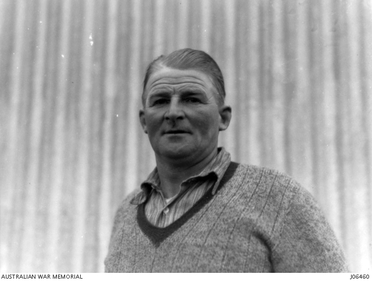jens edvard valdemar karl ingvarson (1894-1993) -
Seaman, sergeant, dairyman

Jens Ingvarsson arrived in Australia just a couple of years before World War I broke out. As many of his fellow countrymen, he enlisted in the Australian Imperial Force where he was awarded the Distinguished Conduct Medal for acts of bravery.
During WWII he was attached to the Australian Training Corps. He lived all his life in Fremantle, Western Australia till he died aged 99.
During WWII he was attached to the Australian Training Corps. He lived all his life in Fremantle, Western Australia till he died aged 99.
Early years
 Jens Ingvarson in full uniform before going off to war
Jens Ingvarson in full uniform before going off to war
Jens (later anglicised to Jack) was born on 23 December 1894 in Brede, Denmark. His father, also named Jens, was a Swedish farm-worker who had migrated to Denmark and married a Danish girl. While still at school, Jens worked on a milk cart for three years earning 5 Danish kroner a month. By the age of 10, Jens and his younger sister, Inger Kristine, were orphaned when both their parents died and Jens was sent off to work for a farmer.
At the age of 14, he went to sea sailing first between Denmark and Germany and later further afield - in 1913 he sailed from Montevideo to Fremantle in Western Australia aboard the 'Lota'. Conditions aboard were hard, the crew was vastly underpaid and underfed - for 17 meals a week they had 'tin dog' and rice. The ship lay out of Fremantle for weeks waiting to unload its cargo of sand and stones. Every Tuesday the captain rowed ashore to buy provisions taking with him three seamen who had the day off.
When it was Jens' turn, on 2 December 1913, he saw an opportune moment and deserted ship. In Fremantle he found work at a farm - where he also met the farmer's niece, Alice Ellen (nee Gundry), whom he was to marry in 1920.
When the First World War broke out, Jens enlisted in February 1916, after becoming naturalised. He joined the 44th Battalion and went to Europe, being promoted to the rank of sergeant.
At the age of 14, he went to sea sailing first between Denmark and Germany and later further afield - in 1913 he sailed from Montevideo to Fremantle in Western Australia aboard the 'Lota'. Conditions aboard were hard, the crew was vastly underpaid and underfed - for 17 meals a week they had 'tin dog' and rice. The ship lay out of Fremantle for weeks waiting to unload its cargo of sand and stones. Every Tuesday the captain rowed ashore to buy provisions taking with him three seamen who had the day off.
When it was Jens' turn, on 2 December 1913, he saw an opportune moment and deserted ship. In Fremantle he found work at a farm - where he also met the farmer's niece, Alice Ellen (nee Gundry), whom he was to marry in 1920.
When the First World War broke out, Jens enlisted in February 1916, after becoming naturalised. He joined the 44th Battalion and went to Europe, being promoted to the rank of sergeant.
war honours
Jens was awarded the Distinguished Conduct Medal (DCM) in 1918 and won a bar to his DCM a year later. The DCM was for the following act of courage and bravery:
On 29 September, 1918, during operations against the Hindenburg line, south of Bony, whilst advancing with his platoon against intense enemy machine gun and artillery fire, and finding that the platoon was held up by a nest of enemy machine guns, he jumped out of a trench and rushed a distance of 100 yards in face of heavy fire, firing his rifles as he ran. He threw bombs amongst the enemy, and succeeded in killing many, captured eight machine guns and two prisoners. The splendid courage shown by him, and his prompt action, removed a dangerous obstacle to the advance of his company. Later, he did excellent work in several bombing attacks.'
Source: Commonwealth Gazette No. 20
Jens was awarded a bar "for conspicuous gallantry and devotion to duty as a platoon sergeant during an attack." Following the death of his platoon commander, Jens led the platoon, attacking the enemy counter, organising a bombing section, and ejecting the enemy from the trenches who as a result suffered many casualties.
later years
After returning to Australia in June 1919, Jens married Alice in 1920 and the couple had four children (Julius, Pauline, Nellie and Lawrence). Jens worked on a dairy farm for five years after the war and then tried his hand at many occupations, working as a fisherman and later returning to milk delivery.
In World War II he was attached to the 2nd Australian Training Corps but did not go overseas. After the war, he worked at a plaster-board factory and when he retired, him and his wife later remained in Fremantle, where Jens had jumped ship many years earlier.
In 1990 Alice Ellen passed away followed by Jens in 1993 at the age of 99.
In World War II he was attached to the 2nd Australian Training Corps but did not go overseas. After the war, he worked at a plaster-board factory and when he retired, him and his wife later remained in Fremantle, where Jens had jumped ship many years earlier.
In 1990 Alice Ellen passed away followed by Jens in 1993 at the age of 99.